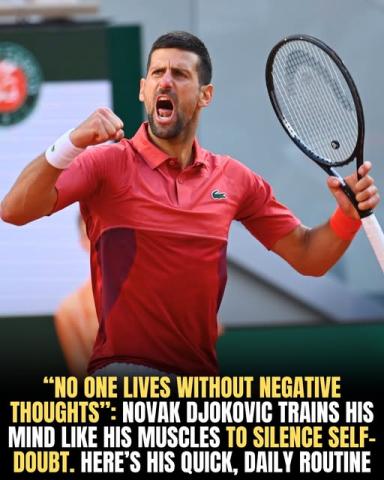
In the pristine, sun-drenched stadiums of Wimbledon and Roland-Garros, where the only sounds are the thwack of felt on polyester and the polite applause of the crowd, it is easy to see a champion like Novak Djokovic as a machine—a perfectly calibrated instrument of athletic domination. With over 20 Grand Slam titles, he has statistically surpassed the legends of the game. Yet, a far more compelling and human story lies beneath the trophies and the triumph. In a recent candid revelation, Djokovic has opened up about the invisible fuel for his drive and the hidden costs of his success: the profound emotional scars left by growing up in war-torn Serbia.
This isn't just another athlete's memoir; it's a masterclass in the modern understanding of peak performance. Djokovic’s journey reveals that true, sustained winning isn’t just about training the body—it’s about the meticulous, grueling, and ultimately spiritual training of the mind.
From Survival to Competition: The Trauma That Forged a Champion
Djokovic’s childhood in the 1990s was framed by NATO bombings, economic sanctions, and deep societal trauma. While most champions learn to compete, Djokovic learned to survive. Experts in sports psychology note that this foundational experience is critical to understanding his psyche.
Expert Analysis: Dr. Eleanor Vance, a performance psychologist who works with elite athletes, explains: "Trauma can create a hyper-vigilant nervous system. In a warzone, this is a survival mechanism. On a tennis court, this can manifest as an unparalleled ability to read an opponent, anticipate danger, and react under extreme pressure. The court, paradoxically, might have felt like a safer, more controllable environment than the outside world. His drive isn't just to win; it's a deeply ingrained habit of overcoming existential threat."
This "survival mindset" provided a ferocious competitive edge but came at a price. The same neural pathways that kept him safe as a child—constant alertness for danger—became the source of intense self-doubt and internal pressure as an adult.
The Amplification of Self-Doubt: Why Success Wasn't the Cure
In a stunning admission, Djokovic flips the common narrative on its head: winning did not silence his inner critic; it amplified it. Each victory raised the stakes, making the potential fall harder. The world saw invincibility; he felt the weight of expectation and the echoes of past instability.
Innovative Insight: This phenomenon is known as the "arrival fallacy"—the belief that achieving a goal will bring lasting happiness. For Djokovic, every Slam win was a temporary high, soon replaced by the anxiety of maintaining that status. The champion who seemed to possess unshakable confidence was, in fact, engaged in a constant internal battle. This shatters the outdated "just win and you'll be happy" model of sports and replaces it with a more nuanced truth: sustainable success requires internal stability, not just external validation.
The Rigorous Mind Gym: Meditation, Journaling, and Breathwork
Djokovic’s solution was radical for the hyper-masculine world of elite tennis. He began to train his mind with the same discipline he applied to his backhand. His toolkit is a holistic regimen for mental fitness:
-
Meditation: To create space between himself and his reactive thoughts, allowing him to stay present during critical points.
-
Journaling: To process emotions, track triggers, and reframe negative patterns, essentially becoming his own therapist.
-
Breathwork: To directly regulate his nervous system. Controlled breathing can lower heart rate, reduce cortisol, and maintain physiological calm under stress—a direct competitive advantage.
-
Spiritual Practice: To connect his efforts to a purpose larger than trophies, alleviating the pressure of his own legacy.
Expert Advice for Players & Coaches: "This isn't woo-woo; it's science," says Dr. Vance. "You wouldn't skip leg day. Why would you skip mental reps? For junior players, start with five minutes of breathwork before practice. For coaches, encourage process-oriented goals ('hit 80% of first serves in') over outcome-oriented ones ('you must win'). This builds a mind that is process-driven and resilient to the inevitable failures of the game."
The Deeper Purpose: Winning Beyond Trophies
Djokovic’s evolution points toward a new frontier in athletic greatness. The ultimate victory is no longer just defeating an opponent on the other side of the net; it is about integrating one's past, mastering one's inner world, and competing from a place of purpose rather than pain.
His "deeper purpose" now appears to be about legacy and inspiration—using his platform to showcase the power of holistic well-being and to give hope to a new generation, not just in Serbia, but everywhere, that our greatest challenges can become the source of our greatest strength.
The Final Analysis: A New Blueprint for Greatness
Novak Djokovic’s story is the blueprint for the future champion. It proves that:
-
The Body is a Tool for the Mind: Physical training is useless without the mental fortitude to execute under duress.
-
Acknowledge Your Past: Don't ignore your history; learn to harness its energy. The very thing that feels like a weakness can be your greatest strength.
-
The Goal is Integration, Not Destruction: The aim isn't to destroy self-doubt or fear—it's to acknowledge it, manage it, and prevent it from controlling your actions.
-
Greatness Has a Cost: Acknowledging the emotional and psychological toll of high achievement is the first step toward sustaining it healthily.
Djokovic’s journey from the rubble of Belgrade to the summit of tennis is more than a sports story. It is a profound lesson in resilience, a case study in the mind-body connection, and a powerful reminder that the most important victories are the ones we win within ourselves.
